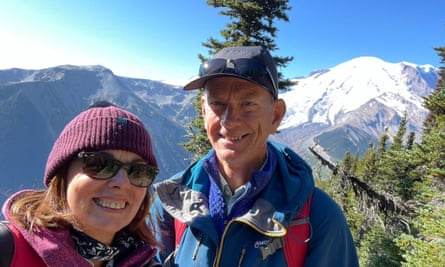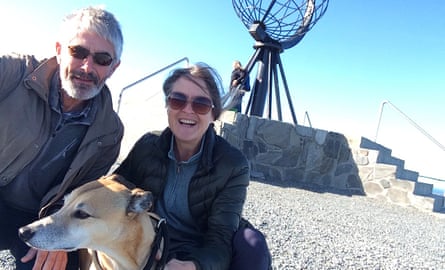
David and Viv Boardman have just arrived in Germany after a long bus-ride between Lille and Dusseldorf. They’re in the middle of a five-month stint backpacking around Europe, America and Australia, deciding where to go a week in advance, and they’ll return home when their money runs out. They haven’t recently finished school or university – they’re both 66 and on a “grey gap year”.
The pair are spending several months exploring the world for the first time in their lives after growing up in a time when extended travel was not the norm. Retirement has given them newfound freedom, and they want to enjoy it.
“One of the reasons we’ve said let’s do it now is while we’re healthy enough, we’re at that age where you don’t know what’s round the corner. We’re having a great time, we’re really enjoying it,” says Dave.
The main challenge the pair have encountered with travelling is technology – especially QR codes, which have led Viv to worry: “Is that it, £50 worth of tickets, that black square?”
The Boardmans are part of a growing movement of people aged over 60 who are choosing to take a “grey gap year” after retirement – a desire that has been fuelled further by the enforced isolation of the pandemic.
While the stereotype of the boomer traveller is a luxury cruise trip funded by housing market gains, people aged over 60 who spoke to the Guardian felt privileged to be able to take the shoestring approach usually associated with younger people.
The opportunity means a lot: recent research by Skyscanner found that over 65s, who grew up in an era in which travel was more expensive and less accessible, valued travel more than any other age group.
Debbie Marshall, a specialist in mature travellers and managing director of the Silver Marketing Association, says that while interest in the “grey gap year” has been building for a few years, “the pandemic has definitely played a part” in an explosion of bookings for 2023.
“Suddenly that window of opportunity feels a whole lot shorter. There’s definitely a pent-up demand for big breaks,” she says.
Popular choices for the “grey gap year” include voluntourism, with older people wanting to contribute skills from decades in the labour market; camper van trips; learning-based trips such as yoga or painting; and even ski seasons, with some chalet companies preferring to hire retirees because they work harder than young people.
Older people are not exempt from the growing popularity of solo travel, Marshall added, with “silver splitters” challenging the stigma attached to travelling alone in the past.
Kate Harrison spent her first “grey gap year” aged 60 backpacking solo around Canada and the US for three months, where she volunteered at folk music festivals. Now 65, she’s planning a big trip around Vietnam, Cambodia and Laos.
To cut costs, she usually stays in hostels. For one stay in Nashville she shared a dorm with several twentysomethings: “They would all fall through the door between 3 and 6am, and I would be getting up at six in the morning leaving them in pitch darkness. I’d come back in the early evening and they’d be getting up like caterpillars turning into butterflies.”
She feels more confident travelling alone as an older person, and benefited from the respect shown to older people, as well as the “invisibility” that means you don’t attract the wrong kind of attention. “People say to me, ‘aren’t you brave going off now’, but to me no – it’s far less scary.”
The main drawback is that aches and pains take longer to go away after overnight coach trips or uncomfortable beds, she says.

Ian and Fiona Shaw, both about to turn 60, are on a year-long camper van trip – which their daughter and her friends are avidly following on their Instagram account.
The pair appreciate how longer breaks give them more time to get to know new people, as well as to spend quality time with each other after decades of marriage.
Ian said friends had asked: “How are you going to cope with a year with each other, because you don’t do it now? It’s been no problem at all, we’re having a great time. We’re really able to connect with each other again.”

Mark Hainge, 65, completed his first “grey gap year” recently with his wife, Kate after joining the army aged 18. “There’s a sense of catching up on something we possibly missed out on earlier in our lives. It’s much better doing it now, we’ve got more time, money, experience and knowledge,” he said.
While he acknowledges that being part of the boomer generation means he is “luckier than most”, he thinks the trip is comparatively accessible. The main expense is the motorhome, funded with lifetime savings, and £40 per day, which he considers comparable to their day-to-day expenses in the UK.
It’s been worth it, he adds: “I’ve always been slightly alarmed about the prospect of retiring to a little place in the country and sitting back growing roses and waiting to die. That doesn’t suit me at all. To have the chance to do something completely different is just so refreshing, I absolutely love it.”



